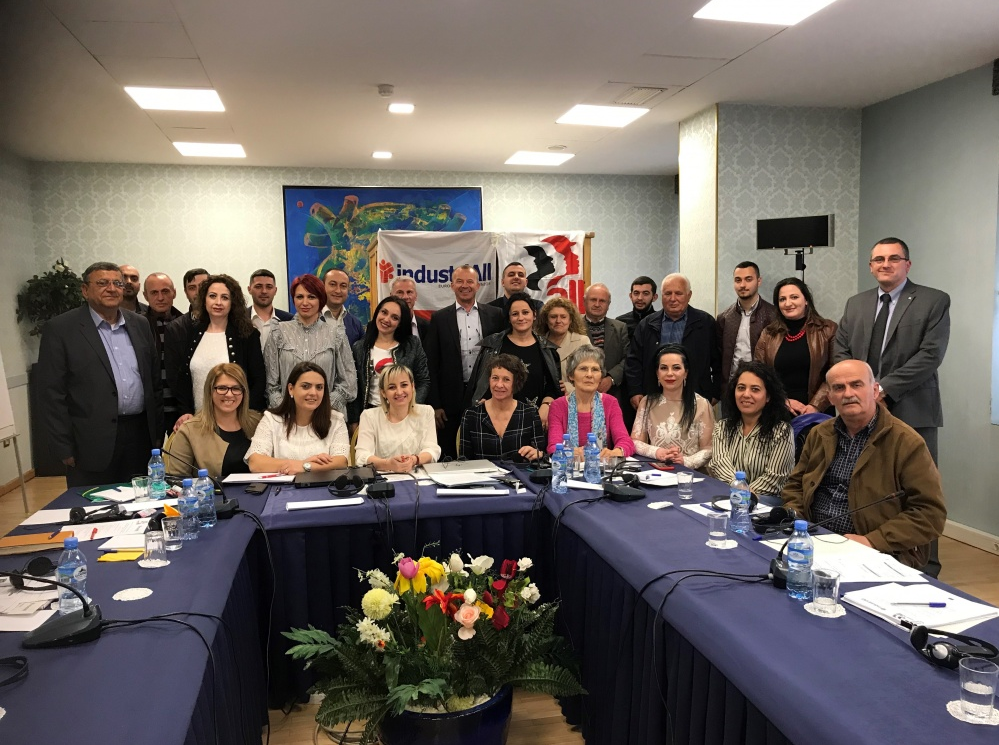Read this article in:
English
2 April, 2019The textile, clothing, leather and shoe industries in Albania employ 51,000 workers, to which tens of thousands of informal workers can be added. Living wages and a unionised workforce are needed for a sustainable future for the country’s garment sector.
At a seminar in Tirana on 27-28 March, part of an EU-funded project “Strengthening the capacity of trade unions in South-East Europe to improve wages and working conditions in the garment and footwear sectors”, unions and employers came together to discuss challenges and solutions.
The two Albanian textile unions have around 3,000 paying members. Koco Jani from the BSPSH confederation says that the SPILT union has invested in organising, but workers are afraid, especially in rural areas where there are few employment opportunities. The average worker is just over 30 years, and 90 per cent are women. Once they find a better-paid job, they leave the textile industry.
In 2018, labour inspectors visited 500 out of 1,200 textile and footwear factories and found wage payment delays, missing social contributions, bad working conditions and dismissals. Problems were exacerbated by the lack of unions in the workplaces.
According to Kol Nikollaj, president of the KSSH confederation, Albania lacks laws on trade unions, collective bargaining and conflict. The textile industry needs a branch collective agreement and company level accords.
Kemal Özkan, IndustriALL Global Union’s assistant general secretary says:“Many of the issues are related to brand responsibility and sourcing practices. Add to that a high level of informality in the sector, poor working conditions and inefficient labour inspections, which the government must be accountable for.
“There is an urgent need for raising workers’ awareness about their rights, and we will support our affiliates in their fight for better wages and conditions.”
Kol Sinjari from Biznes Albania and Bardhi Sejdarasi from the National Union of Fason support the idea of a functioning tripartite national council and an industry-level collective agreement on wages, health and safety, and other elements. Sejdarasi says that the employer side have merged and covers a majority of textile and footwear factories, turning it into a representative partner.
Unions need to be more representative, and participants at the meeting put together an organizing plan, based on a detailed mapping of the factories and brands present in Albania. They include GFA brands Inditex and ASOS, ACT members Arcadia, Bestseller, Next and New Look, and Benetton.
Luc Triangle, industriAll Europe’s general secretary says:
“As a candidate country for future EU membership, it is unacceptable that workers in the garment and footwear industry have to survive on poverty wages in a highly informal sector. This is first a responsibility of an ignorant government and second from global and European brands exploiting this lack of enforceable legislation and absence of decent working conditions and wages. We will continue to fight against this to achieve change.”
Three NGOs present at the seminar, the Gender Alliance, Center for Labour Rights and ICSE, pledged cooperation with the unions to improve the wages and conditions of workers.
The project is carried out in cooperation between industriAll Europe and IndustriALL Global Union, targeting Albania, Bulgaria, Croatia, North Macedonia, Montenegro, Romania and Serbia.
